Disclaimer: This article could be construed as making light of police brutality and violence. I do not condone, nor find humorous people abusing power or hurting one another. However, the Caper this article highlights became a New York beat cop when violence was not only expected, but rewarded. The article is written in such terms.
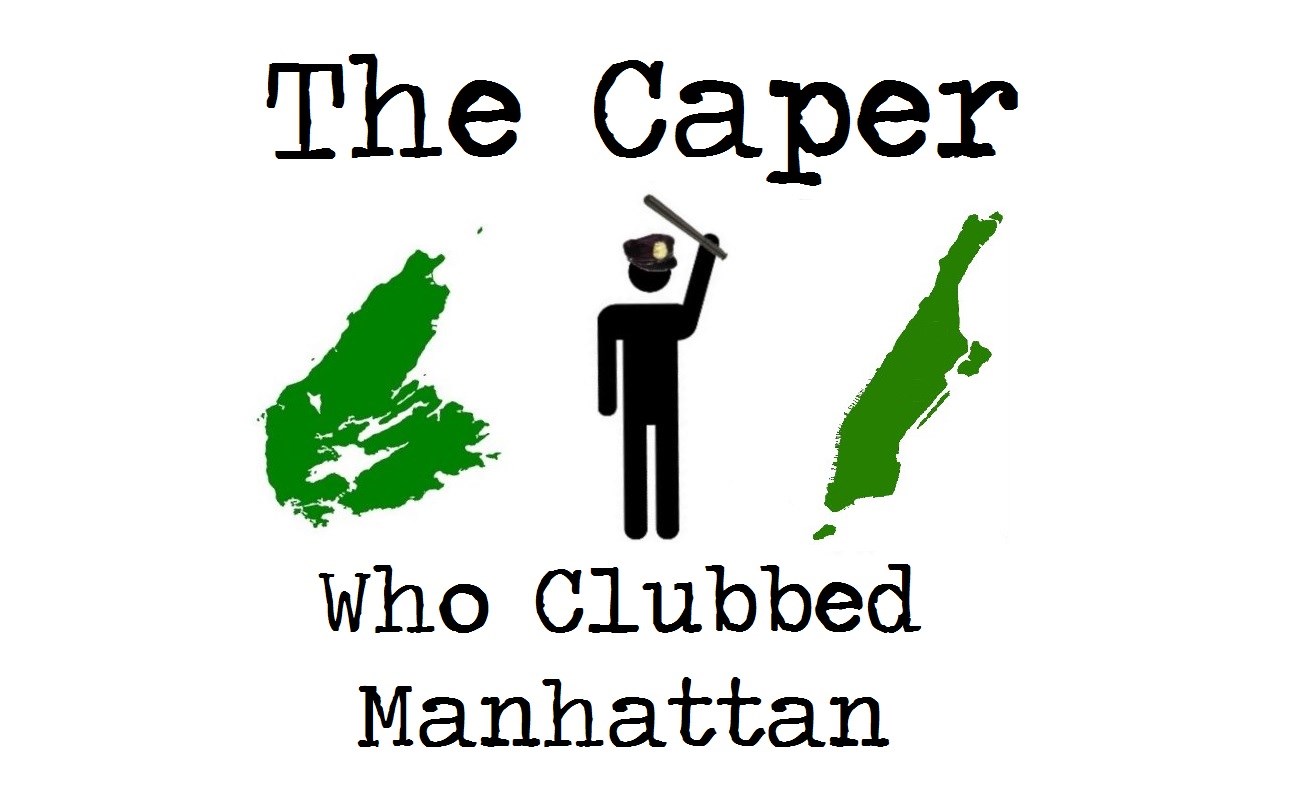
One thing about Cape Bretoners is you never know where one of us is going to show up. I was playing bar trivia in an Irish Pub in Beijing, when I looked at the scoreboard and saw the "Mull River Shuffle Gang." As a Caper teaching English in China at the time, it was as if two universes suddenly collided, and all of this was some sort of glitch in the Matrix. But no, they were fellow Cape Bretoners on holiday, losing at trivia as hard as I was in the capital of China. What can we say? We get around.
A prime example of this being Alexander S. Williams, one of the most famous, or rather infamous NYPD police captains in history. Better known as "Clubber Williams" based upon his implement of choice for his more violent tendencies, he would go on to tame and rename one of Manhattan's most violent territories, colourfully known as Satan's Circus. I would describe him for you, but I couldn't possibly do a better job than the March 1887 issue of Harper's New Monthly Magazine.
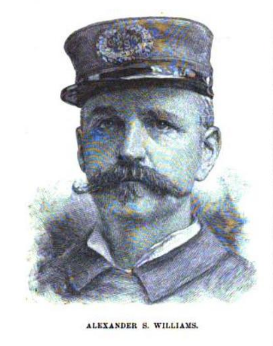
His puppy dog eyes really contradict his deeply aggressive mustache.
"Captain Alexander S. Williams is one of the most prominent of his class. Perfectly fearless and resolute, he has made himself the dread and scourge of the worst criminals coming within reach of his arm." This reputable journal then goes on to describe his nightstick. "Captain Williams's club enjoys the reputation among the roughs of being as hard, ready, and rough as themselves, and is certainly a notable instrument. It's owner is one of the most venomously hated, frequently tried, and most valuable of police-officers."
But we're getting ahead of ourselves. Let's start at the beginning.
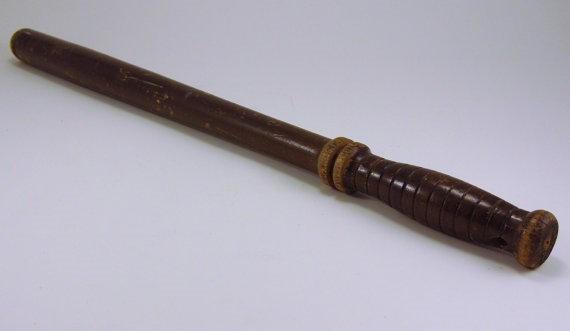
The good ole days, when police brutality left bruises, and not bullet holes.
Unfortunately, not much is known of "Clubber Williams" from the time before he started clubbing people. He was born on Cape Breton Island, but I have found no evidence as to where. As a baby, he was just way too ordinary to warrant anybody keeping track of him in 1839. He was born to a Canadian father and a Scottish mother, whose names I can find no record of, and moved to New York with his family shortly after.
He became a carpenter at a young age when child labour was "in" and spent his young adulthood floating around the earth, building boats in foreign countries as he went. He is reported to be the first Westerner to lay the keel of a sailing ship in Japan, one of the most isolationist countries in the world at the time. To many, such an honour would be the highlight of their life. To Williams, it was a mere footnote.
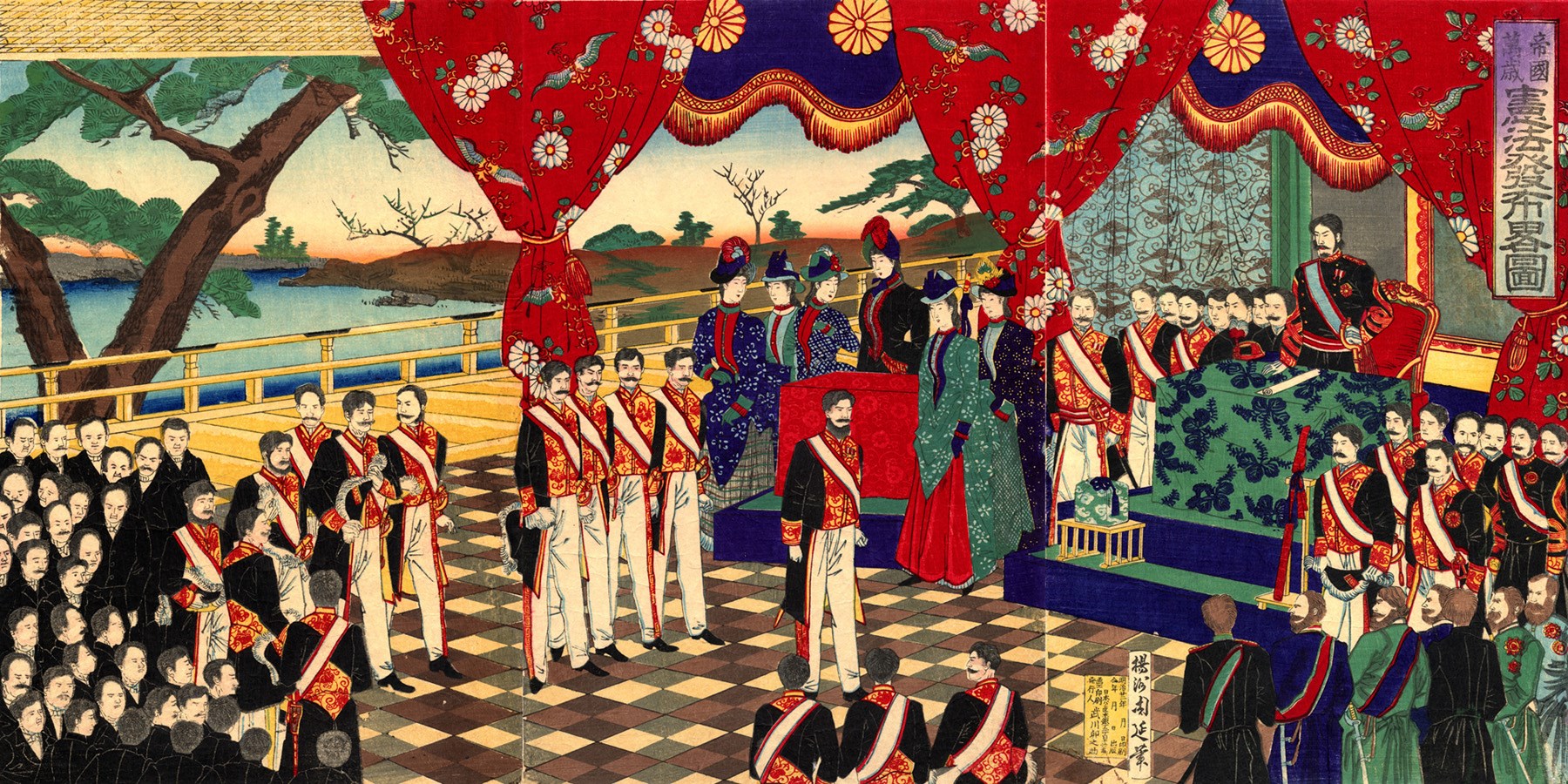
Can we just rename the 19th Century as "The Century of the Stache"
After laying keel in various corners of the world (it's not as dirty as it sounds), Alexander abruptly decided to become a beat cop on the mean streets of New York. On August 23, 1866, Williams walked into the Metropolitan Police Headquarters without a resume, cover letter, or any form of identification, approached the NYPD police commissioner, John Bergen, and asked for the job. Commissioner Bergen responded logically by pointing out he had no idea who this person was, and could be "a convict from Sing Sing for all I know." At this point, Williams flew into a rage, told the police commissioner he could keep the job, and stormed out of the office. Impressed by William's emotional discord and complete lack of self-control, Bergen sent for Williams to be brought back and immediately gave him a position as a patrolman, making it one of the only instances that someone got a job by becoming enraged during the interview.
But before we get to Williams' illustrious and ultraviolent career on the police force, first...
A Note on Cities
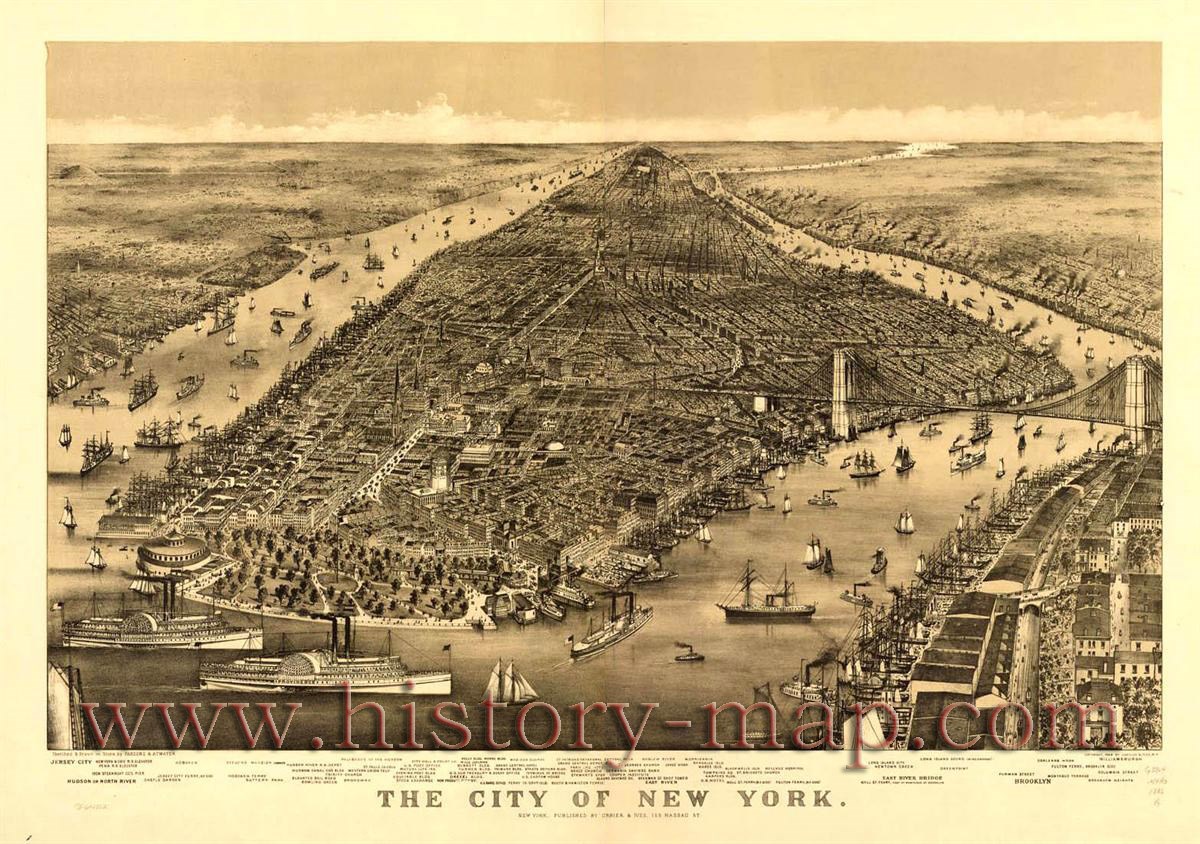
Empathy is a beautiful thing. It is what allows you to feel and respect the emotions of others, and is a major factor in keeping the human race civil and society functioning. Basically, it is what makes you NOT a serial killer. Unfortunately, empathy has one major downfall. It has a limit.
At any given moment, you can only feel complete empathy for approximately 150 people, give or take. This is why hunter-gatherer societies frequently split into two once their populations hit 150, and why populations of over 150 require things like laws and police. Here's an experiment. Look at your Facebook Friends list. How many friends are on it? 600? 1,000? Congratulations! You only truly care about 150 of them. Don't worry. It's not you. It's your silly human brain.
So what happens when you coop up hundreds of thousands of people into a small geographic area where every single one them doesn't care about 99.99% of the rest of the population? Disease, depression, disorder, and above all, violence.
This is the history of cities. Incredibly productive cesspools of scum and villainy. Anyone who tells you about the good ole days, and how we're so much more violent than we used to be should pick up a history book, because the annals of the human race can best be described as hairless bears slowly learning how not to kill each other.
I know sometimes it can really seem like the present is coming apart at the seams, and nostalgia can be quite alluring, but no matter how much NOW sucks, THEN sucked way worse.
It is against this backdrop where we find our protagonist (or antagonist? Maybe we'll just go with "guy") as a cop in one of the most dangerous districts, in one of the most dangerous cities in the world. New York's notorious Gashouse District.
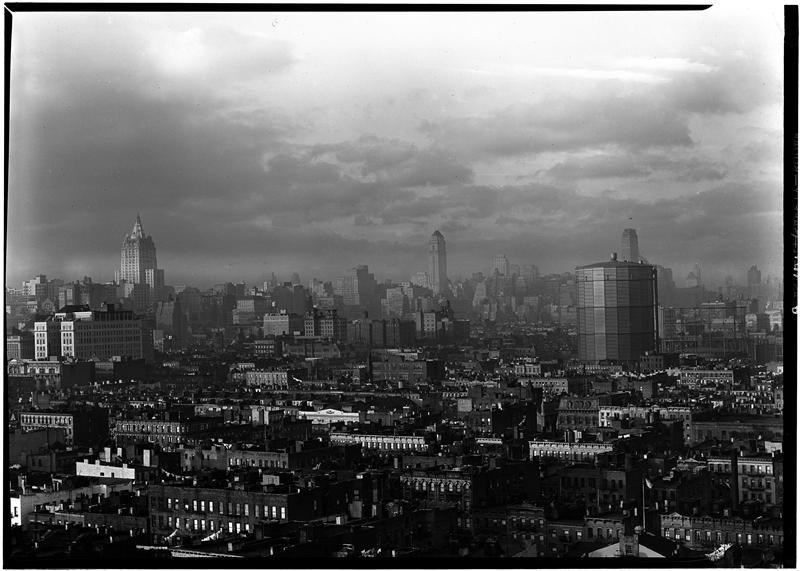
Sometimes, even black and white can't make a picture look classy.
There were two reasons you did not want to live in the Gashouse District:
- There were a ton of gashouses in it, and everything, including you, smelled like gas all the time, and
- It was the home of the infamous Gashouse Gang, which sounds like a barbershop quartet, but in the 19th century, they were the scourge of the Gashouse District.
The Gas House Gang specialized in armed robberies, and they were estimated to have committed between 30 and 40 robberies per night. That's between 11,000 and 14,000 armed robberies a year, by one gang, in one district of Manhattan. By comparison, in 2015 there were only 16,931 robberies of any kind in the whole of New York City. Trust me, the world has gotten a bit better.
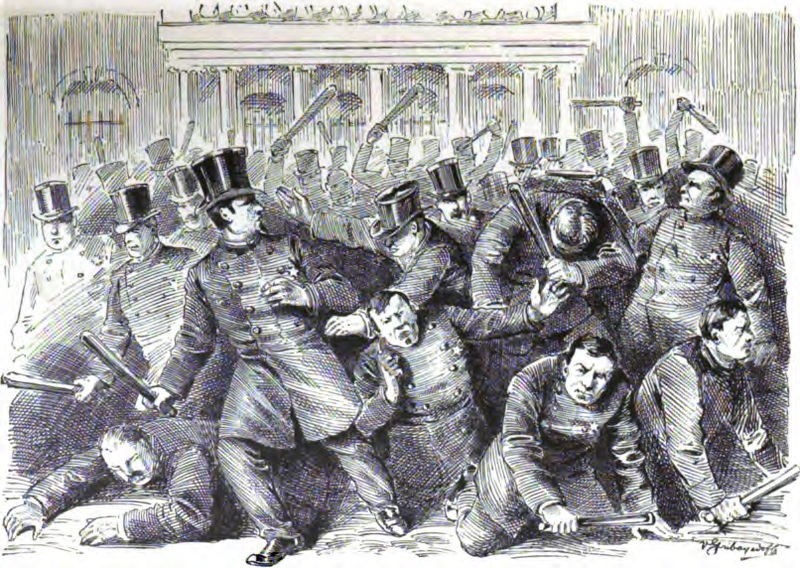
Enter our heroes. Our incredibly violent heroes.
At the end of the 19th century when Alexander S. Williams became a cop, police procedure was pretty rudimentary. The best answer the NYPD had to a big, bad gang in New York was to become a bigger, badder gang. "Clubber Williams" was a cop at a time when sending a criminal to jail or the hospital was completely interchangeable, and "police brutality" was better known as "police work".
And no 19th century NYPD beat cop was better at this "police work" than our adventurous Caper, Alexander S. "Clubber" Williams. Clubber assembled a ruthless squad of fellow officers who beat all suspected members of the Gashouse Gang with or without provocation. Williams broke up the Gas House Gang with "rough-and-ready" police methods, and within 6 years, he was promoted to captain at a time when most people had to buy these types of appointments.
As police captain, Williams is reported to have gotten in at least one fight a day, "filling his office at police headquarters with lines of bandaged, bloody prisoners, who had all done something the police don't like." By 1887, Williams had at least a hundred more complaints against him than anyone else in the NYPD, yet the press loved him. The Evening World, a New York newspaper, ran a continuing series titled "from the Scrap-Book of Alexander S. Williams," which chronicled his inner-city adventures like some sort of hyper-violent Sherlock Holmes. From humble beginnings on our small little island, Williams became an NYPD rockstar.
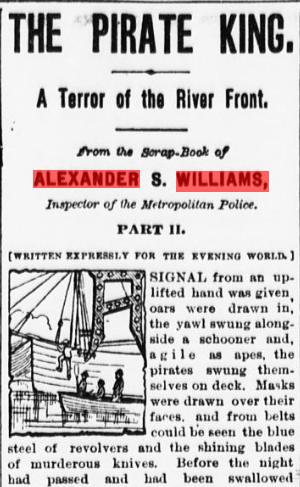
The story of how "Clubber Williams" tracked down, and beat up, The Pirate King!
In 1876, Captain Williams would take his most famous post at the West 13th Street Station, deep within what was then known as Satan's Circus. This precinct was the centre of Broadway's night clubs, gambling resorts, clip joints and brothels. Throughout the years, various noble attempts had been made to clean up Satan's Circus, with only temporary success. William's strategy, however, was in no way noble, and he took his bigger and badder gang of cops to the most crime-ridden area of the most crime-ridden city of the United States.
When accepting the position, Williams said, referring to the series of bribes and protection money he would soon receive, "I've been having chuck steak ever since I've been on the force, and now I'm going to have a bit of tenderloin." The district was henceforth known as The Tenderloin District for the next 40 years. This is the story of how one lowly Caper ruled and renamed the red-light district of Manhattan.

I see I'm not the only one who likes making neighborhood maps. I'm glad I didn't have to make this one.
To a certain extent, police corruption was the best possible strategy a police captain could bring to the Tenderloin. The protection and bribes from the NYPD regulated the financial relationship between the police and the criminals, and everyone knew what was allowed within the district and what wasn't. Although "disorderly houses, gambling houses, and other dens of vice" flourished, less entrepreneurial crimes, such as robberies and murders saw an overall decline.
And even as "Clubber's" fame and fortune grew everyday within this den of thieves, he still patrolled the street every night with his trademark club in hand. He became known as "The Czar of the Tenderloin" and inspired this 1897 song that is miraculously on YouTube today:
Unfortunately, not everyone agreed with Williams strategy, and some people even spoke against him. They were called judges, and they brought him up on charges a total of 18 times. On one such courtroom occasion, when Williams was criticized for his use of excessive force, he responded with "There is more law in the end of a policeman's nightstick then in a decision of the Supreme Court." To say this inside a courtroom, in front of a judge is the equivalent of walking into someone's house and peeing on their carpet.
He was found guilty twice, and the press and the people began turning against him. Luckily for Williams, he wasn't the only one in Manhattan that was fabulously corrupt, and his Republican allies on the Board of Police Commissioners had every charge against him acquitted. It wasn't until the Lexow Committee in 1894 that the extent of Williams corruption became evident. When asked why so many brothels were allowed to operate in The Tenderloin, he responded that they were "fashionable." If you know anything about law, you know this is not an adequate defense. When asked where he received the money for his house, his other house, and his yacht, and his other house, he answered "I bought real estate in Japan and it has increased in value." No one was able to verify this fact, but it was popular opinion that it was a huge lie.
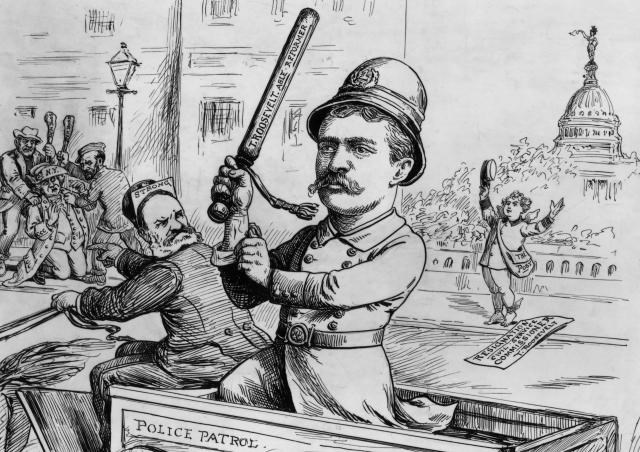
Enter the only man with a bigger club than Williams. Theodore Roosevelt.
In the end, it took a future President of the United States to unseat our Cape Breton born, richest, and most infamous police captain in NYPD history. Theodore Roosevelt decided Williams would retire on May 24, 1895 with a yearly pension of $1,750, and all of his illicit wealth still intact.
He lived the rest of his life quietly, and went into the insurance business where he became quite successful. Williams died in 1917, and insisted on his deathbed that "I never clubbed anyone that did not deserve it."
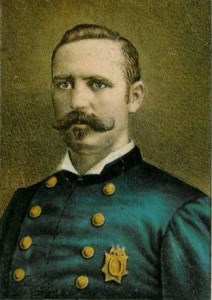
And that's how one lowly Caper came to rule and rename Manhattan's most notorious red-light district.
Past 5 Famous Cape Bretoners You've probably Never Heard of...
Episode 1: The Man who Replaced his Hands with Oscars
Episode 2: The Man who Enjoyed World War 1 a bit too much...
Episode 3: The Woman who Fought Bears and Smallpox





1
Log In or Sign Up to add a comment.- 1
arrow-eseek-e1 - 1 of 1 itemsFacebook Comments